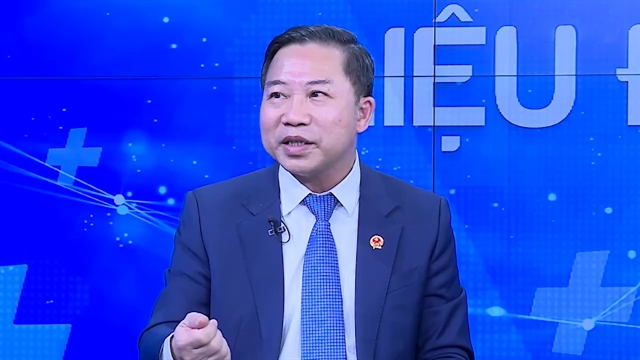 Society
Society


|
| Lưu Bình Nhưỡng, deputy head of the Ombudsman Committee of the National Assembly talks at the "New Generation Cigarette Pilot Proposal: Is It the Right Time?" discussion. — Photo from Internet |
HCM CITY — Việt Nam needs more time to conduct a proper impact assessment and develop a legal framework before trialling new-generation cigarettes, experts have said.
The suggestion follows a Ministry of Industry and Trade plan for a limited-term pilot of heated tobacco in compliance with the Law on Prevention and Control of Tobacco Harms.
The plan has run into opposition, with critics saying it is not the right time to pilot a new-generation tobacco product, including heated cigarettes, since more time is needed to study the impacts and set up a comprehensive and appropriate legal framework.
In Việt Nam, new-generation cigarettes, which comprise heated tobacco products and vape, are a relatively new concept.
The main distinction is that new-generation cigarettes do not burn like regular cigarettes do.
In terms of operation, it uses electrical energy to heat the solution, whether or not it includes nicotine, and creates aerosols that the users inhale.
It does not entail burning, does not emit smoke.
New-generation cigarettes generally have a composition, mechanism of action, technical characteristics, and, especially, a completely different technological element from traditional tobacco products.
Traditional and new-generation tobacco are currently regarded by the World Customs Organisation (WCO) as two distinct categories of products with their own HS codes since there are fundamental distinctions between them.
Việt Nam concurred with the WCO and complied with its regulations. In June 2022 the Ministry of Industry and Trade issued Circular 31/2022/TT-BTC on the Viet Nam Export and Import Products Catalogue with a new sub-group for new-generation cigarettes.
According to experts, the current tobacco product legislative framework is not appropriate or comprehensive enough to regulate new-generation cigarettes.
Instead, Viet Nam needs to develop compatible regulations for this new product line.
Comprehensive assessment needed
Many countries around the world have done research into new-generation cigarettes’ ability to lessen the negative consequences of tobacco.
A study released on March 24, 2021, by the UK Cancer Research Institute said in fact that there is no solid evidence that e-cigarettes increase the threat of cancer.
The Canadian Government recently had research indicating short-term advantages in terms of general health for people who entirely quit smoking and switch to new-generation tobacco.
Contrary to popular belief, there are no studies or reliable figures available in Việt Nam that demonstrate how much less detrimental to health new-generation cigarettes are than regular cigarettes.
The scope and subject of each research vary, and there are differences between Vietnamese users' characteristics and that of people in western nations.
At a discussion titled "New Generation Cigarette Pilot Proposal: Is It the Right Time?," last year, attendees agreed with this viewpoint.
Lưu Bình Nhưỡng, deputy head of the Ombudsman Committee of the National Assembly said: “We can take advantage of research in other countries, but it does not mean that we apply that to Việt Nam.
“Because they judge based on user samples and products that are circulating in their country, while we have no research.”
Concurring with the idea, Phạm Văn Hòa, former member of the Legal Committee of the National Assembly said: " Surveys, statistics, and an impact evaluation of the advantages of and damages caused by a product are legally compulsory when piloting.”
“Việt Nam has not yet released statistics on or evaluations of the effects of new-generation cigarettes on human health. The piloting of new-generation cigarettes should be thoroughly carried out.”
To maintain the quality of new-generation cigarettes and to protect users and the public's health, national standards and technical regulations need to be drawn up.
These must guarantee uniformity in pertinent documents based on references to international experience, which nations already have a comprehensive legal system and effective regulation of new-generation cigarettes.
To guarantee user safety, these standards, particularly technical specifications for heating electronics and additional fire and explosion prevention criteria, must be developed.
It is not appropriate to contemplate trialling new-generation cigarettes to assess their quality until all pertinent technical standards and regulations are in place.
Việt Nam has to develop standardised testing rooms with the appropriate technical equipment to be able to test their standards, including quality and safety.
This is in addition to developing the standards and technical rules required to manage new-generation cigarettes.
Such examples include figuring out how much nicotine a product contains and releases when heated without combustion. Compared to typical cigarette smoke, this is remarkably different.
The only organisation in Việt Nam capable of testing tobacco, the Institute for Tobacco Economics Research, has only recently started learning about specific components in new-generation cigarettes and has not yet investigated their technical elements.
“Before making a choice, we need to dedicate additional resources in terms of personnel, tools and research time to elucidate the issues related to piloting new-generation cigarettes,” experts concluded. — VNS




